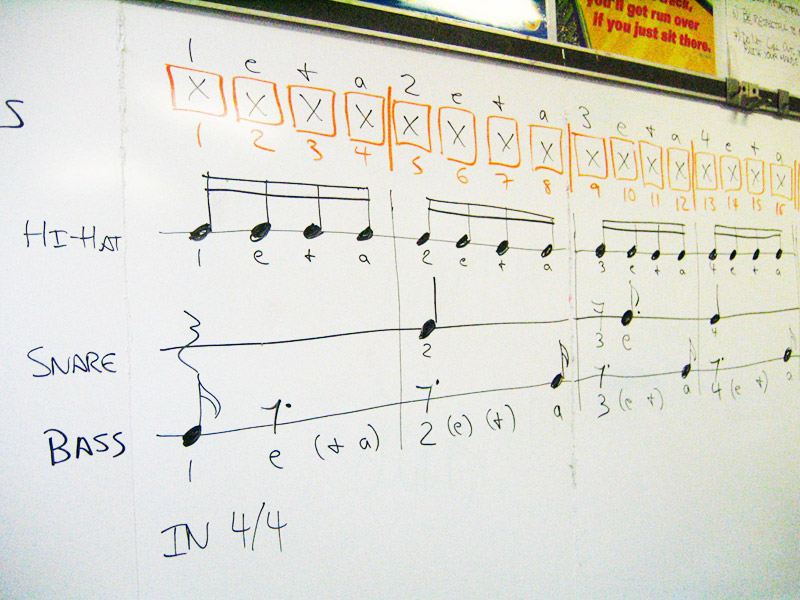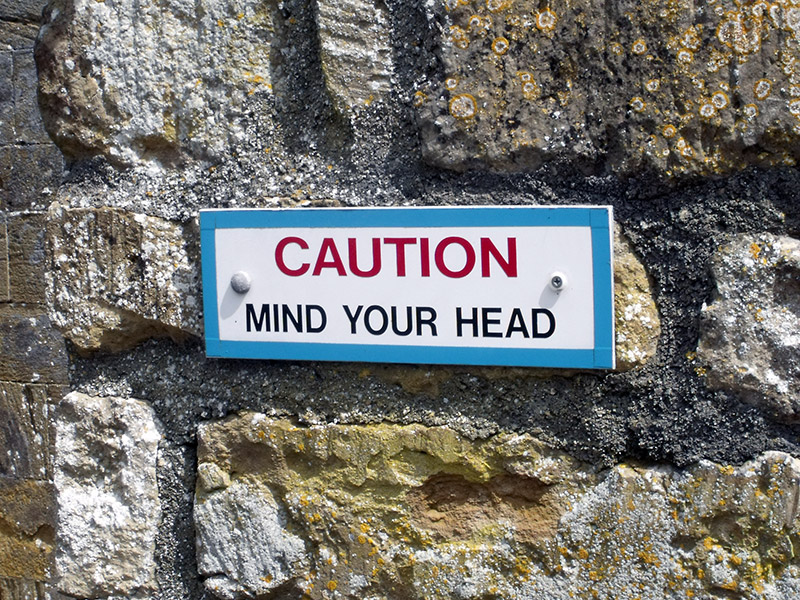You can't learn a language just by studying vocabulary and grammar. There has to be something you give a damn about understanding in the long run. If you're studying Japanese, maybe that's watching anime or reading manga or novels or even actually talking to other human beings. Whatever it is, one reason many of us never become fluent in the languages we study in school is that we lack this motivation. Maybe you chose the language for some lame reason like it was the only class that fit in your schedule. Don't worry, we've all done it.
But even when we start with a stronger motivator, I think another reason we give up is often that we put off the good stuff for too long, waiting for some magic moment when we'll have gone through enough textbook chapters to deal with the language in its natural state. Problem is, even if there were such a magic moment, the material in most textbooks is so dull that chances are you'll never persist that long.
The sooner you grapple with the stuff you love in the original language, the better. Sure, it may feel like beating your head against a wall sometimes. But so does a textbook – and with a textbook, the reward if you manage to punch through the wall is rarely very exciting. No textbook can ever provide the kind of thrill I felt the other day when I actually understood a pun in the manga I was reading.
So when I realized that somewhere along the way I'd developed an interest in Japanese pop music and was frustrated that I couldn't understand the lyrics, I decided that this was an opportunity. Even more so because I love to sing and wanted to be able to sing along.
My level of Japanese right now, after years of stop-and-start in both classes and self-study, is beginner to intermediate with a lot of weird gaps. While it's way too soon for me to be able to translate songs myself, there are plenty of resources on the internet to help out, and I am definitely learning and inspiring myself to keep going. If you want to try it, I've figured out some tricks to help, and also some warnings about what you don't want to learn from songs that I think will be useful whatever your current level.
Picking a Song
For me there are three main points to consider when picking a song to study. The first is of course that I have to love it enough to hear it over and over. This is studying, after all, and some of it is repetitive and painstaking. I don't want to be tired of the song by the time I can sing and understand it.
The second is that there have to be translations and romaji transliterations available online. Fan translations may not all be of fantastic quality, but there's often more than one to chose from, which can teach interesting lessons in itself, as I'll discuss later.
Most fan translation sites are not strictly legal, so I'm going to refrain from linking to a bunch here, but I trust that you all know how to use Google. You will also find some fansubbed videos – I have found that some of these can be quite terrible, but some are OK.
In the best case scenario, you're a fan of one of a few current artists with hopes of international success that provide English subs on their videos. As my example I'm going to be using one of these, the song RPG by Sekai no Owari. Click on the little CC in the lower right corner of the video above and that will bring up the subs. I need to type them out these as I listen because if there's a cleverer way to get at them I don't know what it is. If you're using lyrics sites instead, you'll generally be able to cut and paste.
Third, once I've determined that I can find the materials I need, I will make a first pass of singing along using just the romaji transliteration. This can head off doing a lot of work and then finding out that the song is recorded at a pitch that's not comfortable for me to sing. You also probably don't want to pick a song that's really fast or has crazy rhythms, so by doing this first you'll find out if you're being overambitious on that score. (This one for example turned out to be a bad idea).
Simple folk songs or other older songs can be a good start that avoids this problem. (This is my favorite, which may seem more appealing if you watch this modern take on it as well, although I'll warn you that this one – recorded in support of victims of 3/11 – always makes me a little weepy.) But you'll probably stick with it best if you use songs you already know and love.
How I Lay It All Out

If you follow my instructions, you're going to end up copying everything you find online and pasting into a file, but just a note to start that you should save anything you find interesting for use later. I find that unofficial translations are prone to disappearing, and since they're not strictly legal they're vulnerable to being taken down.
My first step is to save the entire translation, and then, separately, start laying out the romaji lyrics along with the Japanese. Here's the first line of the song above:
空は 青く 澄み 渡り 海を 目指して 歩く
Sora wa aoku sumi watari umi wo meza shite aruku
Now before we go any further, I know that a lot of people feel strongly that you should never use romaji when studying Japanese. And frankly, if I could get these lyrics with furigana for the kanji in a form I could cut and paste into a file, I would use that. But so far I haven't been able to do that, and for me, this is not a reading exercise, so I'm OK with it. My kana reading is already fluent and this isn't hurting it. And let's remember that it's actually perfect natural to learn a word before you know how to write it – that's how it works for native speakers, who already know how to speak their language as children before they learn how to write.
So, if you want to offer to furigana-ize all my lyrics for me, great, let's talk. Otherwise let's put that argument aside and proceed.
Then I line up the kanji roughly with the words:
空は 青く 澄み 渡り 海を 目指して 歩く 目指して 歩く Sora wa aoku sumiwatari umi wo mezashite aruku
Then I look up the words and grammar I don't know, making sure as far as possible that I know why the translations say what they say. I don't try to line up entire lines of translation with the text above – there's no way for that to make sense given the difference in Japanese and English word order. And also, I want to be trying to think in Japanese as far as possible. So I insert only the words I don't already know, above the kanji.
For this song, there are three translations available online, which I'll discuss and compare later. For now we'll go with the translation "Under the clear blue sky, we are walking to the sea." Looking up the unfamiliar words gets me:
be perfectly clear aim at 空は 青く 澄み 渡り 海を 目指して 歩く 目指して 歩く Sora wa aoku sumiwatari umi wo mezashite aruku
Seems like a kind of fancy way to say that thing in the second clause. I note that to myself and move on. As our esteemed Koichi-sensei has wisely said elsewhere, "Most people spend way too much time obsessing over the things they can't figure out." I've got the general idea what's going on in this line, so I'm good to go.
Once I've done this for the whole song, I will annotate some lines as needed so I can sing along. One thing I've already done that in the line above. As I'll talk about later, in singing, the w is sometimes pronounced in the particle を. This singer doesn't do that and I don't want to either, so I took the w out.
There are other singing pronunciations that are unusual, and some of them affect how the words line up with the notes, so I have ways of marking them. For example, syllable-final ん is sometimes sung as a separate syllable to fit a rhythm. For instance, in this song there's a line:
自分 だけ が 決めた 「 答」 を 思い 出して Jibun dake ga kimeta “kotae” o omoidashite
The first word is sung on three different notes, so I mark the n as bold. You will also sometimes hear long vowels and vowel sequences, such as ou as in もう or ai as in ない sung as distinct separate vowels. I use a period to mark a syllable break: seka.i, for instance, if that word is sung on three separate notes.
I also have some annotations I use to help me when the rhythm is unexpected. I'll boldface a vowel or syllable when the syllable on the downbeat isn't what I expect:
大切な 何か が 壊れた あの 夜に Taisetsuna nani ka ga kowareta ano yoru ni
And I'll italicize when a syllable is not pronounced or so unstressed that I need to know for the rhythm.
「目的」 という 大事なもの を 思い出して “Moku tek_i_” to iu daijina mono o omoidashite
In cases that are really hard, if you know musical notation, you can add in notes for the rhythm. Just be aware that if you have to do that right away, you're probably starting on a song that's too difficult.
If you do this for every line and you don't hate the song yet, fire up that music video and sing along!
What I'm Learning: The Basics

I recently read a very interesting book about people who can speak many languages. Toward the end the author asks these people for study hints, and one of them says, "Spend time tinkering with the language every day." I would call that a good description of what I'm doing here, and if a woman who learned seventeen languages recommends it, I am willing to take her word.
And while this isn't the most systematic sort of study, there's definitely specific stuff I'm getting out of it. Vocabulary is one thing for sure. If I learn a line of a song, those words stick in my head, and songs – especially by the same artist – tend to use the same words frequently. Maybe they're not always the most useful words. After all, there are only so many times you're going to need to talk about the stars in the sky or a sleepless night in real life, unlike Sekai no Owari, who seem to work those into nearly every song.
But the same is true of many of the words textbooks start out by teaching. And words learned in a meaningful context that's important to you are just going to stick better. In fact, I'm finding as I go along that the same is true of grammar as well. After all, which of these is more memorable – this line from another Sekai no Owari song:
幻に 夢で 逢えたら それは 幻じゃない
Maboroshi ni yume de aetara sore wa maboroshi janai
If you meet a phantom in a dream, then it’s not a phantom
If you meet a phantom in a dream, then it's not a phantom
Or this line from a grammar site that will remain nameless:
暇だったら、 遊びに 行くよ。
If I am free, I will go play.
And despite the fact that I am not explicitly using this method to study how to read, knowing words has had some benefits in learning reading elsewhere. As I mentioned above, native speakers already know how to speak their language before learning to read it. When I've learned a word from a song and then I encounter the kanji in my studies there's no question I remember it more easily than an unfamiliar word. When hoshi 星 for "star" came up on WaniKani, instead of feeling "oh god, another kanji," instead my heart leapt with recognition, because I already knew that ほし hoshi is the word for star. It was like seeing an old pal in a new place in new clothes instead of trying to make friends with a stranger from scratch.
As far as reading, while I can actually already sing some lines of this song from memory, the plan for the next step is to try to strip away the romaji. I experimented with the karaoke version, which has furigana for the kanji, and I could keep up reasonably well, but the horribleness of the musical arrangement killed it for me, so I won't try that again. I want to sing along with the bands I like, not some horrible computer-generated elevator-music version.
The other benefit I think this is having is pronunciation fluency. Studying on my own, I don't have a lot of real opportunities to speak. In singing, I have no choice but to keep up with the music so I have to learn how not to stumble over my syllables.
What I'm Learning: The Deep Stuff

I've found that another important and interesting lesson you can learn from this process is getting really down and dirty with how many different ways there are to translate the same simple line. Songs are great for this because the differences are partly because the grammar of Japanese is so different from English, and partly because essentially we're talking about poetry, not simple "My name is Linda, pleased to meet you" textbook phrases.
For this song, along with the official one from the video, I found two other translations, this one, which I can't really vouch for one way or the other, and the other from a site that seems to be consistently of good quality. And I found that even a relatively simple statement like the first line of this song is different in all three translations:
空は 青く 澄み 渡り 海を 目指して 歩く
Sora wa aoku sumi watari umi wo meza shite aruku
Under the clear blue sky, we are walking to the sea
The sky was a clear blue as we each walked toward the beach
And the sky is full of a beautiful blue, to the sea we walk confidently
If simply walking to the beach under the blue sky can be phrased in three different ways, you can imagine that more metaphorical statements differ even more:
「 方法」という 悪魔にとり 憑かれないで
“Houhou” to iu akuma ni tori tsukare naide
Don’t be possessed by the demon called “The method”
Don’t get possessed by the evils of wondering “how”
Don’t get carried away trying to find “the way”
The fact that these more poetic lines aren't as straightforward means that in one case the non-official translations seem to have missed the point. Here's the two fan translations:
" 煌めき"のような 人生の 中で
"Kirameki" no youna jinsei no naka de
In the midst of my "bright and shining" life,
In my "glittering" life
The official translation:
In a life that's like a flash that ends so fast
Apparently the band intended quite a different mood for that line, one that's kind of no surprise if you know their style – lots of cheerful-sounding, upbeat songs that on closer inspection turn out to have depressing lines about mortality, etc. (In fact, their first hit was literally a song about a dead baby).
Basically, this is art, and a non-native speaker attempting a translation may just not get a reference or understand a metaphor. But just to confuse matters further, official translations may be deliberately non-literal. As we've talked about elsewhere, decisions on how to promote media for a different country can involve more than simple translation. (We can see a lot of this in movie and book titles, in both directions.) I found one line in another one of their songs where the official translation deliberately did it completely non- literally. The line which is also the song's title, honou 炎とmori 森のカーニバル, literally means "carnival of flame and forest," to the extent of actually using the English word "carnival" in kana. But in the official translation subtitles on the video, it's translated "Tokyo Fantasy." I'm guessing this is because they also have a movie of the same name and think this will help promote it if it's ever released abroad. So while unofficial translations may lack language expertise, official translations may make choices that are confusing because they've got bigger fish to fry than our attempts to study Japanese.
Warnings

Studying Japanese from songs does have some downsides that you need to be aware of. The most obvious one is earworms from hearing the same song over and over. You have to really like the song to do this whole routine, and then it might make you tired of it or even hate the song, which is sad.
But more importantly, just like you have to be careful learning from anime so you don't end up speaking like Donald Duck or something, you need to be careful about learning things from songs that aren't appropriate in speech. There are a lot of ways songs are not like regular spoken language in any language, and they come in all areas of grammar, pronunciation, and word use.
As far as vocabulary and words and phrases, like I've already mentioned above, surely no one talks as much in real life about the stars in the sky as Sekai no Owari does. Likewise, I'm pretty sure the use of "I love you" in songs in all languages far exceeds its use in actual speech. (If you search on ありがちな 歌詞 you can find lots of blogs, etc, that list cliches in J-pop.)
One example of a specific word to be cautious of is the pronoun boku. I've been told that what the textbooks say, that women do not generally use this word, holds true in real life a lot more than you'd expect from listening to the lyrics of female singers. In fact, it's quite common for female singers to sing from a "male perspective" and use words they might not use in everyday speech. The same goes for male speakers. Bottom line: just because they sing it doesn't mean it's common to say it.
When it comes to pronouns though the real point to be aware of is a grammatical one: songs seem to use a lot more personal pronouns than real speech, especially first and second person pronouns. This is a real danger because this is one of the most important differences between Japanese and English grammar. One that is very hard for English speakers to grasp. For example, the logical subject of a sentence doesn't have to be expressed in Japanese, if it's clear from context. The normal way to say "I went" is Ikimashita. If you succumb to the English-speaker's impulse to say Watashi wa ikimashita, you're saying something with a particular emphasis, more like "Me? I went." You'd never know this from all the watashis and bokus and kimis that are thrown around in pop song lyrics.
There are also some pronunciation differences in singing. I've already mentioned some above, such as the pronunciation of syllable-final ん as a separate syllable. (There are reasons that this makes sense in Japanese that I don't have room to explain here, but hope to get into in another post soon.) There's also the particle をsometimes pronounced as "wo." Certain romaji systems transcribe it this way as well. If you've never heard it before, you can hear it in this song in the last line of the first verse, which is Karappo no kaban wo kyutto kakaete.
Another really interesting phenomenon is that there seems to be some imitation of American pronunciation. You hear this in British rock singers all the time. There seems to be a sense that, since rock was invented in America, American English is the language it ought to be sung it. Since Japanese singers are not singing the same language, it's not as all-pervasive, but there are some you might be able to hear if you listen closely. The one that I can hear is that Japanese singers sometimes use an American-sounding R. I actually started noticing this because the lead singer of Sekai no Owari noticeably does NOT do this. His R is clearly the Japanese type. I realized that it sounded odd to me, because it was unlike most other songs I'd heard.
There are a few more that a linguist friend researched for me, that I am going to be listening for. I'll just throw these in so that if you can understand the linguistic terms you can listen for them too:
- The consonant we write as sh, as in し, etc: the normal Japanese pronunciation of /sh/ is heavily palatal, while the American English pronunciation is post-alveolar. Many singers imitate the American sound.
- Some singers pronounce vowel sequences (/ai/ for example) almost like diphthongs.
- The /u/ sound, especially in /ou/, is pronounced more strongly, and with more lip rounding.
- Heavier aspiration on /t/.
My final warning is that I find that when I get comfortable enough, I can sing along even when I've forgotten what the lyrics mean. This may be a result of years of experience as a choral singer, where you have to sing in many languages you don't understand. I always make sure when this happens to stop singing along uncomprehendingly in the car until I can go back and review the translation. The goal here is understanding, even if it's not the most real-world-useful language material in the world, so no singing gibberish syllables! If nothing else, someday when you and I meet, we should be able to have a conversation about love and the stars in the sky and understand what we're talking about. And it will be beautiful.
